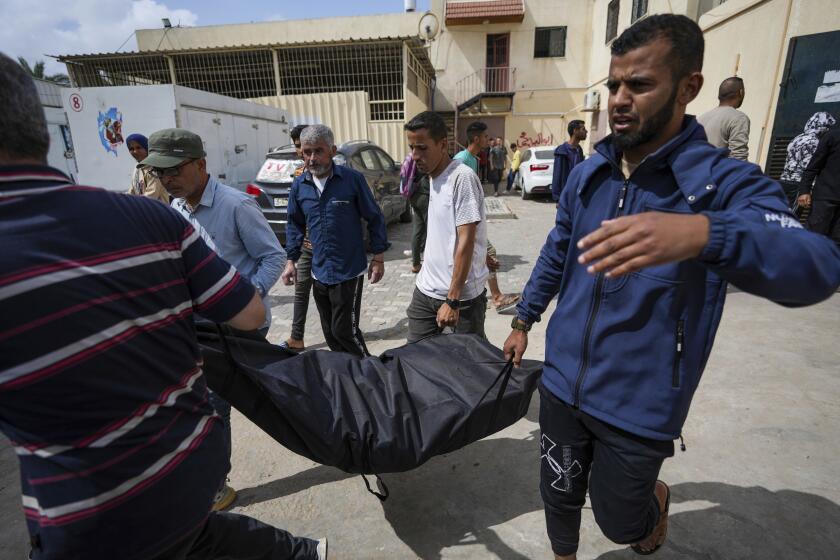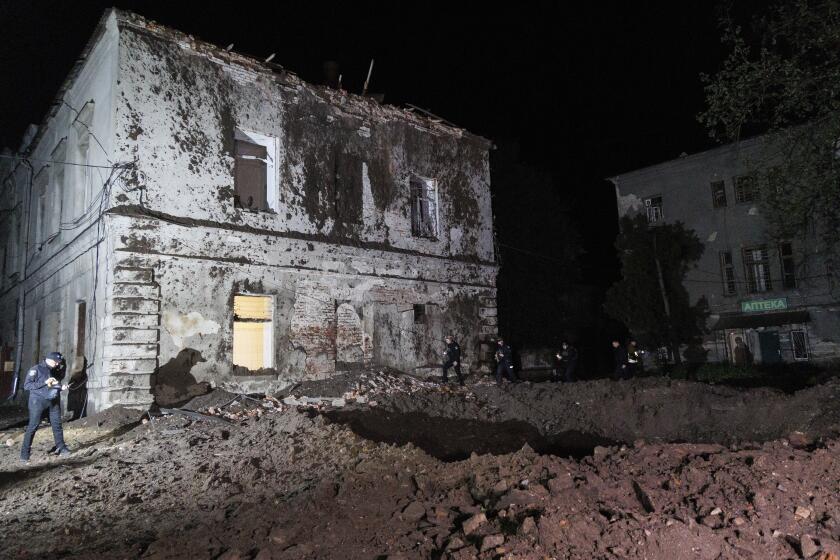Palestinian Infighting Hits West Bank
Clashes between rival Palestinian factions spread to the West Bank on Monday as armed followers of Palestinian Authority President Mahmoud Abbas’ Fatah movement ransacked and set fire to the offices of the Hamas-led government and briefly abducted a Hamas lawmaker.
Amid fears the violence might escalate, Abbas commanded security forces to restore order after the series of clashes, which began in the Gaza Strip earlier in the day and then moved to the West Bank.
In the southern Gaza town of Rafah, Hamas fighters attacked a building belonging to the Preventive Security Service, a large police force dominated by Fatah. Hamas militants there also opened fire with automatic weapons and rocket-propelled grenades, sparking a shootout that left a bystander dead and 15 people injured.
The attacks occurred after a Hamas militant was killed during a shootout between Hamas fighters and Preventive Security Service members in Rafah.
Later in the day, hundreds of gunmen loyal to Abbas fired shots and trashed the offices of the Hamas-led Cabinet in the West Bank city of Ramallah, igniting a fire in the Cabinet building that was quickly put out. The group, including many members of the Palestinian security forces, also opened fire on the Palestinian parliament building in Ramallah. No injuries were reported.
The clashes marked a significant spread of the often-violent, months-long power struggle between Hamas, the radical Islamic group that gained control of the Palestinian government after winning elections in January, and the once-dominant Fatah movement led by Abbas.
Sporadic shootouts between gunmen affiliated with Hamas and Fatah have left more than a dozen people dead in recent weeks. But until now, most of the violence has been in Gaza, not in the West Bank, which forms most of the Palestinian territories and where Fatah is stronger.
After attacking the parliament building, armed Fatah men destroyed furniture and computers in a Hamas office in Ramallah and, separately, kidnapped Khalil Rabai, a Hamas legislator, from a street here.
Rabai, from the West Bank city of Hebron, was released unharmed a little over an hour later and taken by authorities to Abbas’ presidential compound in Ramallah. Abbas was in Gaza City at the time.
After news of Rabai’s abduction, mosques in Gaza aired calls for Hamas followers to take to the streets in protest.
In a telephone interview, Rabai said he was kidnapped by gunmen in a car as he walked with two other Hamas legislators. Rabai said the men, who identified themselves as members of the Al Aqsa Martyrs Brigade, a militia tied to Fatah, covered his head with his jacket and beat him while berating him.
Rabai said they left the other two men behind and took him to a secluded area in Ramallah before releasing him. “They stopped us on the street and they were beating us hard,” Rabai said.
Hamas has stepped up its efforts to block an Abbas-sponsored referendum on a Palestinian statehood plan that would implicitly recognize Israel. On Monday, Hamas, which rejects Israel’s right to exist, moved its battle against the referendum to the parliament, where it holds a hefty majority.
But after a sometimes fiery debate, lawmakers agreed to postpone a vote on whether to hold the referendum, in hopes that Abbas and Hamas leaders could reach agreement on a political program that might dampen the crackling tensions.
Abbas, a relative moderate, has set the territorywide vote for July 26. He has cast the referendum as a path toward renewing negotiations with Israel and ending an international aid boycott that has hobbled the Palestinian economy since Hamas took power in March.
The referendum, based on a document crafted by well-known Palestinians jailed in Israel, calls, among other things, for a Palestinian state in all of the West Bank, Gaza Strip and East Jerusalem.
Leaders of Hamas see it as an attempt to undermine their fledgling government. Hamas lawmakers, with 74 of the parliament’s 132 seats, argued Monday that the measure was illegal because Palestinian law contained no provisions for such a vote.
Sheik Hamed Bitawi, a Hamas lawmaker, said Abbas should have brought the proposal to parliament before setting it by decree.
“The presidential decree is unconstitutional and it is not sacred, because the only sacred thing is the Koran,” Bitawi said during the five-hour debate, conducted simultaneously in Ramallah and Gaza City via video link.
The referendum bid is a risky strategy for Abbas, who has generally been viewed as weak and reluctant to confront Hamas.
Polls have shown wide public support for the so-called prisoners document, and passage of the ballot measure could give Abbas a political boost in promoting talks with Israel.
But Israeli leaders, including Prime Minister Ehud Olmert, have dismissed the referendum as irrelevant. Hamas leaders have harshly denounced it and seem determined to ensure no vote takes place. A Hamas prisoner leader who signed the document withdrew his name Sunday in protest.
Still, Abbas has left open the possibility of reaching agreement with Hamas on a unified program and canceling the vote.
Separately, Israel is expected to release findings as early as today of its investigation into an explosion Friday on a beach in Gaza that killed eight civilians. Military officials have suggested that the blast might not have been caused by an errant Israeli artillery round, as initially believed, and may have resulted from a Palestinian rocket that veered off course or from explosives planted by militants against a possible Israeli incursion targeting launch sites in the northern Gaza Strip.
Meanwhile, Olmert met in London with British Prime Minister Tony Blair in hopes of gaining support for his plan to unilaterally draw permanent borders for Israel by 2010 if there is no progress toward peace with the Palestinians.
Blair called for a fresh push for a negotiated settlement that would create a Palestinian state adjacent to Israel. U.S. officials have responded cautiously to the idea of Israel drawing borders on its own and have urged Olmert to pursue talks with Abbas.
Times staff writer Ellingwood reported from Jerusalem and special correspondent Abukhater from Ramallah. Special correspondent Fayed abu Shammaleh in Gaza City contributed to this report.
*
(BEGIN TEXT OF INFOBOX)
Back story
Power in the Palestinian Authority is split between two main factions, Fatah and Hamas. Fatah is loyal to Palestinian Authority President Mahmoud Abbas, who was elected last year after the death of Yasser Arafat. Hamas won legislative elections this year and controls parliament. Hamas rejects the existence of Israel and has undertaken numerous attacks on Israeli civilians; Abbas advocates a Palestinian state that would exist alongside Israel. Hamas is an Islamic movement; many members of Fatah are secular. The two groups have been vying for control of the Palestinian security forces. Fighting broke out in the Gaza Strip this spring and has resulted in more than a dozen deaths in recent weeks.
More to Read
Start your day right
Sign up for Essential California for news, features and recommendations from the L.A. Times and beyond in your inbox six days a week.
You may occasionally receive promotional content from the Los Angeles Times.






